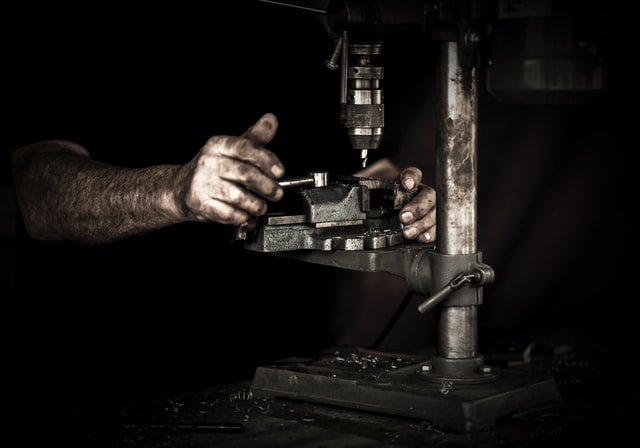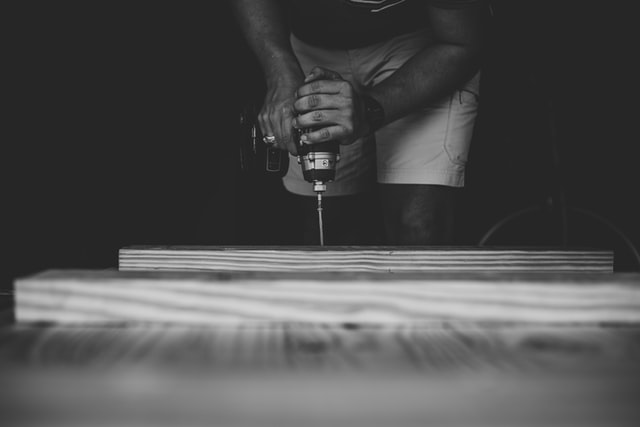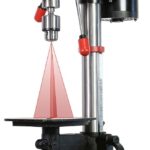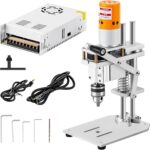This article will help you be aware of some important issues before you spend that money. The first two points are concerned with choosing the main specs of the drill presses. The last point is to guide you through some of the smaller features you should look for in your purchase.

1. Job Material Vs. Motor
The first thing you need to know is the amount of horsepower (hp) that you need. One hp is overkill for most beginners and amateurs. If you are looking at remodeling furniture and mainly working with wood, 1/3 hp will work just fine. If you are looking to work with heavier materials like steel but medium-sized workpieces, 2/3 hp will be more than enough.
However, if you are consistently going to be drilling 2″ holes in thick steel pieces, then maybe one hp will not be a bad investment.
The size of your workpieces is also an important point to consider. Suppose you are looking to work with furniture, cabinetry, treehouses, and similar jobs. In that case, honestly, you might even be okay with a minimal 3.5″ travel. But still, I would recommend getting at least 5.5″ travel to remain flexible.
Speaking from personal experience, if you are working on unique prototypes of any kind or love to experiment, don’t go below 5.5″ travel.
2. Work Frequency Vs. Motor
The other important consideration is the amount of work and daily use you expect from the drill press. The power of the motor is also a good indicator of its longevity. If you are looking to work on one or two small projects, a $75 small drill press with 1/3 hp is fine.
Maybe you are looking to buy a drill press that is going to get a lot of use. Maybe you want to train youngsters on it, or you expect to use it in a busy workshop indefinitely, that motor will not last long enough. It is all about the number of hours of work you expect in the day. In this situation, even if you will be specifically working with wood, go for a higher horsepower like 2/3 hp.
3. Quality of Life Features
Quality of life features go beyond the main specifications of specs. What quality of life features might you want? Let me explain.
Dealing with Play
Drill presses develop play and wobble after some use. Once the play gets too much, you will have to manage it. Older drill presses usually have split quill castings. They allow you to manage any play easily and in a few minutes. You will be able to control any wobble without too much hassle. Try to find a split quill casting for your specs, but it won’t be easy, so you might have to compromise on this one.
Depth Stop
Depth stop mechanisms are good for training purposes and also unique and complex workpieces. If you are looking at working with simple workpieces, then it is not necessary, and you can pass it. But if you imagine a scenario where you will be making many shallow holes, make sure you have a good depth stop mechanism. Otherwise, you will have to make a depth stop yourself.
Variable Speed
Most drill presses you will find will have variable speed settings. The question is, how often will you need to change speeds? If you are working in a professional setting where time is really important and the jobs are unique, you want a drill press. This continuously variable speed system uses buttons or wheels to control it.
For most beginners, you will only work with similar-sized and similar material workpieces and drill sizes. Most amateurs don’t have to change speed settings for weeks or months on end. If you identify with that, don’t splurge on continuous variable speed and automatic control.
Pulley Material
Beginner drill presses often save costs by installing aluminum pulleys for the speed system. Don’t do that. Spend $10 more and get a drill press with steel pulleys. For minimal use, aluminum pulleys might work for you, but if the drill press has used aluminum pulleys to cut costs, who knows what other expense they skimped out on.
Sound Reducer
To know a good drill press, look for ways to reduce the machine’s noise and vibration. Open the top box with the pulleys and inspect if there are rubber pieces installed. If you don’t see those rubbers, you should know the manufacturers did not pay attention to reducing noise.
If you are working in your home, you need to look into how the manufacturer minimized the machine’s noise and buy the drill press that cares about that.

Final Thoughts
Most likely, no store-bought drill press is going to be perfect for you. Everyone has their preferences, styles, and needs. Buy the drill press that gets you the closest to your goals, and then create modifications to make your drill press the perfect machine.
NEIKO 10181A Step Drill Bit Set, 3 Piece, Spiral Grooved for Faster Drilling, Step Bits for Stainless Steel, Metal, Wood, Plastic, Unibit Cone Drill Bits with 31 Step Sizes Total
Product DescriptionPREMIUM STEP BIT: Each unibit is constructed of industrial high-speed steel with a titanium nitride coating for durability and strength to punch and drill clean holes in materials like plastic, aluminum, wood, copper, stainless steel, and other types of sheet metal.
STEP DRILL BIT FOR METAL: With a split point tip that accelerates cutting speed while preventing angled walking away from center line of bore, drilling holes in metal is fast, efficient, and clean.
SPIRAL DESIGN: The two-flute spiral grooved design deburrs chip, dust and debris for clearance and smooth cutting. With 31 step sizes, each hole made with these step bits will be precise.
QUICK-CHANGE: The 1/4-inch hex shank makes for easy, convenient, and quick stepper bit switches and is compatible with impact ready power tools.
INCLUDES: Each bit set comes with 3 drill bits of a combined 31 sizes to add to your drilling arsenal: 13 step drill (1/8, 5/32, 3/16, 7/32, 1/4, 9/32, 5/16, 11/32, 3/8, 13/32, 7/16, 15/32, 1/2-inch) 6 step drill (3/16, 1/4, 5/16, 3/8, 7/16, 1/2-inch) and 12 step drill (3/16, 1/4, 5/16, 3/8, 7/16, 1/2, 9/16, 5/8, 11/16, 3/4, 13/16, 7/8-inch).
Product Details| Brand: | NEIKO |
|---|
| Model #: | 10181A |
|---|
| Size: | Spiral |
|---|
| Color: | Titanium |
|---|
| Dimensions: | 6 X 3.5 X 0.75 inches (Length X Width X Height) |
|---|
| Price: | $17.99 |
|---|
NEIKO 10181A Step Drill Bit Set, 3 Piece, Spiral Grooved for Faster Drilling, Step Bits for Stainless Steel, Metal, Wood, Plastic, Unibit Cone Drill Bits with 31 Step Sizes Total
Lichamp Jumbo 2-3/8" Unibit Step Drill Bit for Metal, Extra Large Drill Stepper Bit for Hard Metal Heavy Duty, 12 Sizes from 1/4" to 2-3/8", Spiral Grooved, C5BK
Product DescriptionONE BIT FOR ALL DRILLING: One bit can drill 1/4 inch, 3/8 inch, 19/32 inch, 3/4 inch, 1 inch, 1-3/16 inch, 1-3/8 inch, 1-5/8 inch, 1-3/4 inch, 2 inch, 2-3/16 inch, 2-3/8 inch 12 different diameters of holes, saves time and effort in replacing the bit
DURABLE AND STRONG: Durable high speed steel with black coating ensures durability and sharpness, reduces friction, runs cooler, resists heat, corrosion and rust, and extends the life of the cutting edge even in extreme temperatures
EXTRA LARGE STEPS DRILL: Shank diameter is 13 mm (1/2 inch), use one step drill to drill different sizes of holes, much more convenient than using multiple drills, ideal for DIY projects in home, garden, workshop
HIGH PERFORMANCE: Split tip is at 118 degrees for better wear resistance. Double helix blade design makes smoother cuts, easier to dislodge material particles and cleaner drilling operations, can be used with electric drills, rechargeable drills and more
WELL DESIGNED: Provides stability during the drilling process, minimizes noise and vibration, which improves work efficiency and safety, bringing a smoother and quieter drilling experience
Product Details| Brand: | Lichamp |
|---|
| Model #: | SDB-C501BK |
|---|
| Warranty: | 1 Year |
|---|
| Size: | 3/16" to 1-3/8" |
|---|
| Color: | Black |
|---|
| Price: | $39.39 |
|---|
Lichamp Jumbo 2-3/8" Unibit Step Drill Bit for Metal, Extra Large Drill Stepper Bit for Hard Metal Heavy Duty, 12 Sizes from 1/4" to 2-3/8", Spiral Grooved, C5BK
KSEIBI 9 Steps 3/16-3/4 inch SAE Standard Industrial Grade Step Drill Bit Ready Impact 1/4 inch Shank, 575077 High-Speed Steel Metal Drill Bits Black Oxide M2 Material
Product DescriptionKSEIBI Step Drill Bits with jam-free performance feature a dual-flute design delivering up to 2X faster hole times, up to 4X longer life and up to 50% more holes per battery charge than the competition. Ideal for drilling large- and small-diameter holes in steel and plastic, these bits are optimized for cordless drills running at high speed.
Constructed with high-speed steel and black oxide M2 material for superior strength and wear resistance, making it ideal for drilling through metal, stainless steel, plastic, and other materials.
Spiral flute design with 9 different steps provides smooth and efficient drilling through a range of thicknesses without the need for multiple bits, making it a go-to tool for any project.
The tapered design ensures precise and accurate drilling every time, while the 1/4-inch impact shank provides a secure and stable connection to your power tools.
Industrial-grade construction ensures durability and longevity, making it a reliable tool for professional tradespeople and DIY enthusiasts alike.
Product Details| Brand: | KSEIBI |
|---|
| Price: | $16.97 |
|---|
KSEIBI 9 Steps 3/16-3/4 inch SAE Standard Industrial Grade Step Drill Bit Ready Impact 1/4 inch Shank, 575077 High-Speed Steel Metal Drill Bits Black Oxide M2 Material
DEWALT Step Drill Bit Set, 3-Piece (DWA1790IR)
Product DescriptionTitanium Nitride Coated two flute spiral design provides longer life and better chip removal for the DEWALT drill bit set
Split point tip of the drill bit increases speed
Laser engraved numbers increases step visiblity
1/4-inch hex shank
Optimized for impact driver usage
Product Details| Brand: | DEWALT |
|---|
| Model #: | DWA1790IR |
|---|
| Dimensions: | 6 X 5 X 0.88 Inches (Length X Width X Height) |
|---|
| Price: | $74.90 |
|---|
DEWALT Step Drill Bit Set, 3-Piece (DWA1790IR)
Klein Tools KTSB03 Step Drill Bit Double Fluted #3, 1/4 to 3/4-Inch with Easy-to-Read Markings and Targets, 3/8-Inch Hex Shank
Product DescriptionDURABLE COATING: Step bits are coated with aluminum titanium nitride, providing a durability that is 10 times greater than black oxide, ensuring an extended bit lifespan
CLEAN CUTS: Two straight flutes on this Step Drill Bit provide chip removal and cleaner cuts
SECURE GRIP WITH DURABLE HEX SHANK: The thick 3/8-Inch hex shank prevents rounding out in the drill chuck, providing a more positive grip and secure operation
LASER-ETCHED MARKINGS: High-visibility markings are provided for primary hole sizes, making it easy to identify the desired hole size and achieve accurate drilling
NON-WALKING DRILL TIP: The fast-starting, non-walking drill tip ensures precise and accurate drilling, allowing for clean and professional results
MULTIPLE MATERIAL APPLICATIONS: Suitable for steel (up to 16 gauge), wood, plastic, and aluminum, offering versatility and convenience
Product Details| Brand: | Klein Tools |
|---|
| Model #: | KTSB03 |
|---|
| Size: | 9-hole sizes |
|---|
| Color: | Black |
|---|
| Dimensions: | 5.3 X 3.4 X 0.2 Inches (Length X Width X Height) |
|---|
| Price: | $35.99 |
|---|
Klein Tools KTSB03 Step Drill Bit Double Fluted #3, 1/4 to 3/4-Inch with Easy-to-Read Markings and Targets, 3/8-Inch Hex Shank
WORKPRO 3-Piece Step Drill Bit Set, 1/4" Hex Shank Quick Change High Speed Steel Titanium Coated Drill Bits for Plastic, Sheet Metal, Aluminum Hole Drilling, Well-Organized Bag Included,Metric
Product DescriptionHigh speed steel along with titanium coating ensures outstanding durability and sharpness for plastic, aluminum, copper, stainless steel hole drilling
Two-flute design provides faster, smoother, accurate cutting and prevents metal scurf from flying around for improved safety
Quick change 1/4" hex shank (6.35mm)can be easily fit into power driver, drill and press drill
A well-organized bag included to provide users with easy storage and transport
Set includes: Bit #1 (5 steps): 4mm, 6mm, 8mm, 10mm, 12mm; Bit #2 (9 steps): 4mm, 6mm, 8mm, 10mm, 12mm, 14mm, 16mm, 18mm, 20mm; Bit #3 (15 steps): 4mm, 6mm, 8mm,10mm,12mm,14mm,16mm,18mm,20mm,22mm,24mm, 26mm, 28mm,30mm,32mm
Product Details| Brand: | WORKPRO |
|---|
| Model #: | W004585AE |
|---|
| Size: | Metric |
|---|
| Dimensions: | 3.93700787 X 0.4724409444 X 0.4724409444 inches (Length X Width X Height) |
|---|
| Price: | $20.99 |
|---|
WORKPRO 3-Piece Step Drill Bit Set, 1/4" Hex Shank Quick Change High Speed Steel Titanium Coated Drill Bits for Plastic, Sheet Metal, Aluminum Hole Drilling, Well-Organized Bag Included,Metric
THINKWORK Four Spiral Flute Step Drill Bit Set, 5 Pcs HSS Step Drill Bits (1/8"-1-3/8") Unibit Step Drill Bit, 1/4" and 3/8" Shank Step Bits for Aluminum, Wood, Plastic, Metal
Product DescriptionENHANCED DURABILITY: Our industrial-grade step drill set is meticulously crafted from high-quality alloy steel and undergoes multiple manufacturing processes. Each drill bit is carefully inspected at the factory to ensure superior quality and longevity.
IMPROVED STABILITY: Unlike ordinary step drills that often suffer from deflection during cutting, our four-flute step drill bit provides exceptional stability. This feature enhances accuracy and cutting speed, making it perfect for stainless steel drilling. In fact, it offers a significantly longer service life compared to regular step drills.
5PCS NITRIDING STEP BIT KIT: Our 5-piece nitriding step bits set includes a range of sizes to cater to various drilling needs. The set comprises step bits with diameters of 3/16"-1/2" (6 steps), 1/8"-1/2" (13 steps), 1/4"-3/4" (9 steps), 3/16"-7/8" (12 steps), and 3/16"-1-3/8" (19 steps). All these bits come in a sturdy blow molded case for easy storage and transport.
VERSATILE DRILLING CAPABILITY: With its powerful drilling capability, our step drill is suitable for piercing holes in various materials, including thin metal, copper, aluminum, iron, carbon steel, wood, and plastic. It's an essential addition to any DIY enthusiast's toolbox and can be utilized for a wide range of household projects.
USER-FRIENDLY DESIGN: Our step drill bits feature laser-engraved step sizes, ensuring clear visibility and eliminating concerns about wear and tear during use. This design element enhances convenience and accuracy, making the drilling process easier and more efficient.
DEDICATED CUSTOMER SERVICE: While our products undergo stringent quality inspections, unforeseen issues caused by accidental factors may occur. In such cases, we are committed to providing professional customer service. If you encounter any quality problems, please contact us via Amazon, and we will promptly replace the defective item with a new one.
Product Details| Brand: | THINKWORK |
|---|
| Model #: | W6139 |
|---|
| Size: | 5 Piece |
|---|
| Dimensions: | 6 X 1.5 X 4 inches (Length X Width X Height) |
|---|
| Price: | $35.99 |
|---|
THINKWORK Four Spiral Flute Step Drill Bit Set, 5 Pcs HSS Step Drill Bits (1/8"-1-3/8") Unibit Step Drill Bit, 1/4" and 3/8" Shank Step Bits for Aluminum, Wood, Plastic, Metal
Vouyar 1/4 to 2-3/8 Inch HSS Step Drill Bit for Metal Sheet, 12 Sizes Extra Large Drill Stepper Bit for Sheet Aluminium, Plastic, Wood, Heavy Duty, Spiral Grooved
Product DescriptionSize: 12 steps, even more versatile. A truly one-for-all solution for drilling holes on plates. Drills 1/4”, 3/8”, 19/32”, 3/4”, 1”, 1-3/16”, 1-3/8”, 1-5/8”, 1-3/4”, 2”, 2-3/16”, 2-3/8”.
Laser engraved size mark: Easy to identify, remains visible even during drilling.
Tri-flat shank: For optimal compatibility and consistency. 1/2" (12.7mm). Fits most rotary drills like hand drills and bench drills.
Clean, smooth cuts: Features dual spiral flute design which allows fast residuals/debris removal. Fast and smooth cutting for clean holes, consistently. Improved durability.
Heavy-duty: Cuts holes on Iron sheet, Mild steel, Galvanized steel, Aluminum, Copper, Plastic, Wood, or anything that has similar or lower hardness as these materials. (Cuts upto 3mm in thickness)
Product Details| Brand: | Vouyar |
|---|
| Size: | 1/4 - 2-3/8" |
|---|
| Price: | $21.99 ($1.83 / Count) |
|---|
Vouyar 1/4 to 2-3/8 Inch HSS Step Drill Bit for Metal Sheet, 12 Sizes Extra Large Drill Stepper Bit for Sheet Aluminium, Plastic, Wood, Heavy Duty, Spiral Grooved
OXMUL Large Step Drill Bit(Pro),16Holes 2", High Speed Steel, Drill Bit Set Duty for Metal, Wood,Plastic Tri-Shank. 2Pro
Product DescriptionLarge Drill Bit 2"Pro / 16HOLES / Mid-Duty for Metal & Wood / Tri-Flatted Shank
【16-HOLES︱2Pro】ONE BIT FOR ALL! 16HOLES! Large Size 7/32"~2"! It is easily to cut metal/Wood sheet. Mid-duty for Metal, Aluminum, Wood, Plastic
【More 16Holes︱7/16" Tri-Flat Shank】All sizes(<2) are included! 16 steps: from 7/32,1/4",3/8",1/2",5/8",3/4",7/8",1", 1-1/8",1-1/4", 1-3/8",1-1/2",1-5/8",1-3/4",1-7/8",2". 2-Straight-Flute:Stronger than four flute.
【Mid-Duty for Metal】 Be clever at cutting Large holes in Metal/Wood/Plastic/Aluminum/Copper. This Drill bit can easily drill Large holes at most 2 inches to help you DIY
【A Work Horse】This straight shaped step bit is a work horse. Easily drilled through various platform of your zero-turn mower, bucket, lug bolt, old rack, iron rotors, washer, hydroponics tubing, water pipe, cabinet
Product Details| Brand: | OXMUL |
|---|
| Model #: | 2Pro |
|---|
| Size: | 1Unibit 1/4—2 Inch |
|---|
| Dimensions: | 2 X 2 X 3.9 Inches (Length X Width X Height) |
|---|
| Price: | $29.85 |
|---|
OXMUL Large Step Drill Bit(Pro),16Holes 2", High Speed Steel, Drill Bit Set Duty for Metal, Wood,Plastic Tri-Shank. 2Pro
ZELCAN 34 Sizes M35 Cobalt Step Drill Bit Set, 1/8" to 7/8" Four Spiral Flute Drill Bit Set for Metal, Titanium-Coated HSS Unibit with 1/4" Hex Shank for Stainless Steel Aluminum Copper Wood Plastic
Product DescriptionDrilling Made Easy: With four sharp cutting blades, Zelcan's step drill bit set ensures quick and smooth drilling through steel, aluminum, copper, wood, plastic, and other tough materials, just like a hot knife through butter
Versatile 34-Size Drill Bits: Our drill bit kit includes 3 drill bits, covering sizes from 1/8" to 1/2", 1/4" to 3/4", and 3/16" to 7/8". This comprehensive kit ensures the perfect solution for all your drilling needs
M35 Titanium-Coated HSS Build: Made of M35 robust high-speed steel with a titanium coating, each step drill bit ensures exceptional strength and lasting endurance to withstand even punishing use
Smooth & Clean Drilling: Designed with four-spiral flute, this step bit set enables faster cutting and drilling compared to dual or single flute bits. It also efficiently clears away chips for smooth performance
Compact & Portable: Each of our unibit step drill bits comes in a handy storage case, keeping it accessible for both home and on-the-go projects. Stay organized and ready for action anytime, anywhere
Product Details| Brand: | ZELCAN |
|---|
| Model #: | 4M35-03 |
|---|
| Size: | 34 Sizes, 1/8" to 7/8" |
|---|
| Price: | $58.99 |
|---|
ZELCAN 34 Sizes M35 Cobalt Step Drill Bit Set, 1/8" to 7/8" Four Spiral Flute Drill Bit Set for Metal, Titanium-Coated HSS Unibit with 1/4" Hex Shank for Stainless Steel Aluminum Copper Wood Plastic
















